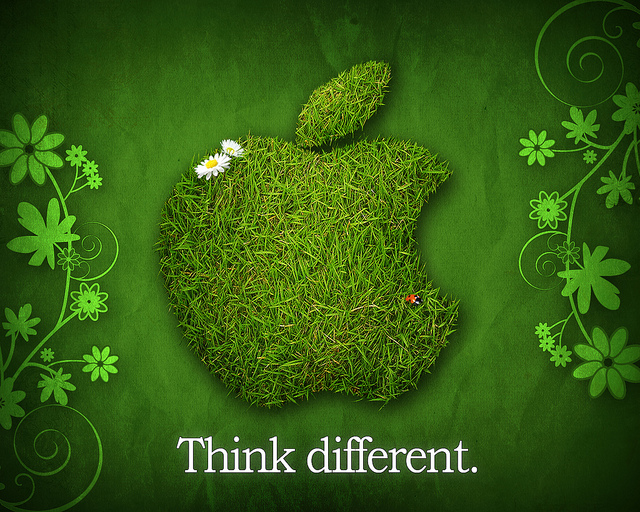
The grass in this image is likely glued on. (Image by Earl Wilkerson.)
EPEAT (the Electronic Product Environmental Assessment Tool) is a national standard (funded in part by the EPA) that certifies electronic products as “environmentally preferable.” Among other things, EPEAT considers energy consumption and recyclability in awarding products one of three levels of certification.
Last week, all of Apple’s desktop and laptop computers were certified as EPEAT Gold. Today, none of the company’s products appear on the index at all.
From the Wall Street Journal:
In order to meet the standards, recyclers need to be able to easily disassemble products, with common tools, to separate toxic components, like batteries. The standards were created jointly by manufacturers, including Apple, advocacy groups and government agencies. Frisbee says an Apple staff member told him at the end of June that the company no longer wanted Apple computers to be listed as EPEAT certified.
“They said their design direction was no longer consistent with the EPEAT requirements,” Frisbee said. The company did not elaborate, Frisbee said. “They were important supporters and we are disappointed that they don’t want their products measured by this standard anymore.”
IFixit.com suspects that design changes seen in the new MacBook are to blame.
It’s no coincidence that the decision came just weeks after the release of the very-difficult-to-repair MacBook Pro with Retina Display. When we tore it down last month, we noticed that EPEAT certification was quietly left out of Apple’s marketing material. Even the environmental report for the new 15-inch non-Retina MacBook Pro, which is not much changed from last year’s model, no longer mentions EPEAT at all. …
When we originally tore down the Retina MacBook Pro, we could not separate the battery from the upper case. The next day, after a lot of elbow grease, we were finally able to get them apart—but in the process punctured the battery, leaking hazardous goo all over.
The problem, iFixit suspects, is that the glued-on batteries (and other components) make it much harder for recyclers to separate out components for reuse.
Apple’s products remain certified on other standards, such as with the EPA’s Energy Star program. And the company touts its green credentials on its “Apple and the Environment” page — itself in part a response to a campaign by Greenpeace several years ago. (Greenpeace currently rates the company as the fourth-greenest computer manufacturer.)
The decision could have an economic impact for the company. Again, from the Journal:
Many corporations like Ford, HSBC, and Kaiser Permanente require their CIOs to purchase computers from sources that are EPEAT certified, said Sarah O’Brien director of outreach for EPEAT. And the U.S. government requires that 95% of the electronics it purchases be EPEAT certified.
Apple will probably manage to survive.




